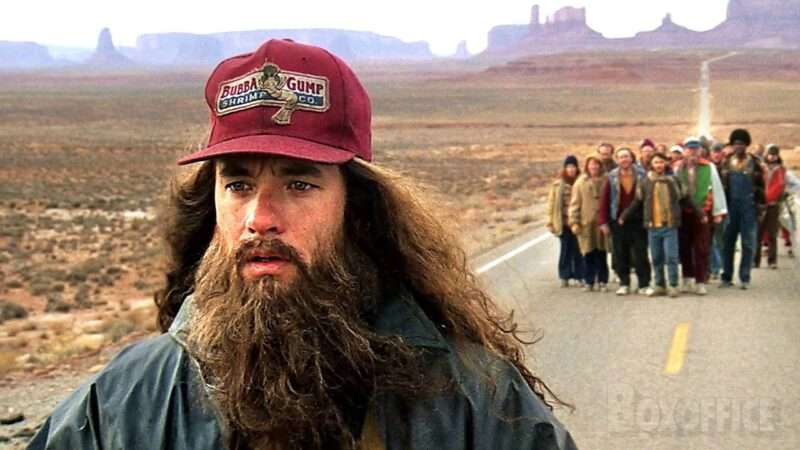
I've never much fancied Forrest Gump, but inside the Robert Zemeckis historical fantasy, there's a scene set in 1976 that I reckon reverberates with many people who retain vivid memories of that exhausted Bicentennial year.
Our Zelig-like hero Forrest, after having earned a Medal of Honor in Vietnam, encountered Abbie Hoffman at the march on the Pentagon, conducted ping-pong diplomacy in China, inspired John Lennon to write "Imagine," and tipped off the cops during Watergate, finally proposes to and beds his lifelong crush Jenny, only to wake up and find the mercurial hippie long gone. So, the Tom Hanks character does what so many people seemed to be doing in the mid-'70s, literally or metaphorically: He takes off running.
Nowadays, 10Ks and marathons are joyous community experiences of endurance and affirmation. But we knew better in the seventies—you ran because you were lonely, or off somehow, or simply because the world was no longer tolerable sitting still.
In the autobiographical 1976 made-for-TV movie The Loneliest Runner, a youthful stand-in for writer/director Michael Landon learns how to race because he's an adolescent bedwetter whose mother shames him by hanging his soiled sheets out the window. In 1973-74, the inexplicable fad of running in public naked swept the nation, with The Joy of Streaking on every bookshelf, live televised events serially interrupted by mid-'70s pubic grooming, and the requisite Ray Stevens novelty hit shooting up to Number One. In the 1976 thriller Marathon Man, the compulsive running of Dustin Hoffman is readable as desperate evasion from a past and present too horrible—and torturous—to contemplate.
At the dawn of its popularity, jogging was perhaps correctly understood as escapist, inherently self-centered, and detached from the always-pressing geopolitical and cultural upheavals that roiled the world from 1963 to 1974. It was the perfect metaphor fodder for The Me Decade. "Ordinary folks," Tom Wolfe wrote in that famous 1976 essay, "now had enough money to take it and run off and alter the circumstances of their lives and create new roles for themselves."
And it was also…healthy, as exercise and an exhaustion-induced reorientation from the political to the personal. The human attention span needs a little crop rotation now and then, lest the soil of the mind turn to dust.
As we limp into 2023, there are flickers of suggestions that our extended dark period of high-alert, routinely apocalyptic politics may be starting to peter out. Donald Trump, the main character of the 2015-22 era, is finally transitioning to an NPC, having suffered successive electoral, legal, and reputational defeats. Bipartisan freakouts over the globe-straddling power of social media companies are beginning to feel ridiculous in the wake of massive tech losses and the off-puttingly erratic behavior of Twitter's solipsistic new owner. COVID-19 as a dread-inducing and society-reshaping pandemic is mostly behind us.
Good thing, too, since Lord knows, our lives away from headline politics have suffered protracted neglect. Life expectancy was trending downward even before COVID came along. Our teens, especially teen girls, are experiencing mental health crises at rates not seen in a generation. Able-bodied men are not working, deaths of despair keep increasing, and community institutions are withering on the vine.
The inchoate yet all-too-real intuition that something just feels wrong has sparked a publishing mini-genre of attempted explanations—Martin Gurri's The Revolt of the Public, Timothy P. Carney's Alienated America, Richard Reeves's Of Boys and Men, J.D. Vance's Hillbilly Elegy. While the specific causes are still being debated, a generally agreed-upon effect is that this frustrated citizen energy has been channeled into politics, or at least into heightened political consumerism, giving rise to a global populism (of both right and left) not seen since the collapse of communism three decades ago.
But populism has an uncanny knack of not delivering on its promises, leaving those frustrated citizens with a choice: Either double down on support for the populists (whose global reach may have crested in 2020) or direct that energy into more fruitful pursuits.
Already, we are seeing some preliminary indications of a turn away from political obsession. The media companies that fattened on anti-Trumpism are being starved of subscribers and shedding staff. Birth rates, having fallen steadily for 15 years, are experiencing a post-COVID "baby bump." Those who do politics for a living—journalists, consultants, hucksters—are letting the desperation show, trying to elevate possible Trump successor Ron DeSantis into a Nazi enabler or Joe Biden into an election-canceling commie.
Returns are observably diminishing on doom-scrolling the news, arguing digitally with strangers, and mashing the "donate" button to some person or group who shares and stokes your political hatreds. The effective methods for improving our personal, familial, and even societal dissatisfactions lie right there at our fingertips, or better yet, shoes—going out for a walk, participating in community institutions, getting the kids off of smartphones, reading an actual book, traveling to places we haven't seen before.
The grotesque machinery of federal politics—the annual end-of-the-year, 13-digit cromnibus negotiated by a handful and read by none—is impervious even to your best tweets and dankest memes. The public policy failures affecting you are almost certainly local, not national, with public meetings you can often walk to. Your body isn't getting any better slumped over your laptop; your thoughts aren't deepening by consuming information in 10-second bites.
New Year's resolutions are not my bag, and I never did catch Marie Kondo when she was taking off. But what I wish in 2023 for the country and everyone living in it is to find as much happiness and fulfillment and relief and restoration as possible, far away from distant culture war theatrics and life-and-death electoral contests, and closer to those long, slow spaces of human contemplation and exploration. It's been a weird and stressful 7 years—or 14 or 22. Time to take off running.
The post In 2023, People May Finally Be Breaking Their Obsession with Politics appeared first on Reason.com.







